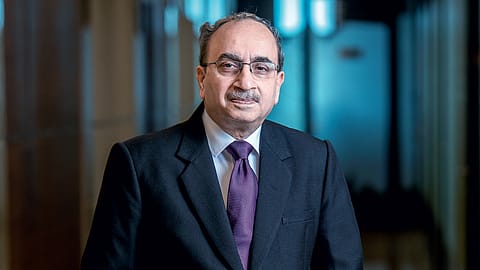Last-Mile Banking With SBI
India's largest lender leads financial inclusion, leveraging its vast network of branches, banking correspondents and financial literacy centres.

This story belongs to the Fortune India Magazine July 2023 issue.
A NETWORK OF OVER 25,000 branches and 76,000 business correspondents are powering State Bank of India's push to make banking accessible to millions in the farthest corners of the country. The result: India's largest lender has notched up the highest share (28%) of the 492 million accounts opened under the Pradhan Mantri Jan Dhan Yojana (PMJDY), which aims at financial inclusion of every household in the country. The state-owned bank has now embarked on financial inclusion 2.0 — beyond opening accounts.
"When we opened these (accounts), they were all zero balance. Over a period of time, the average balance in these accounts has become almost ₹4,000. It means we should be able to channelise (these) small savings from across the country," SBI chairman Dinesh Kumar Khara informed the World Economic Forum (WEF) earlier this year. SBI is providing loan facilities to account holders with small businesses, based on the balance in their accounts.
"This initial loan facility gives us enough visibility of the nature and kind of transactions they are doing. We have started running analytics on these accounts and are also offering pre-approved business loans," Khara said. "When it comes to inclusivity, this is going to go a long way," he added.
The SBI chairman also says robust Internet connectivity has aided financial inclusion in a big way. "We have around 1.2 billion cellphone connections. We also have some 800 million Internet connections and that has helped a lot in expanding financial inclusion."
Though many more are able to access credit (179 million, or 22% of the adult population in 2021), over 160 million consumers were still under-served in 2021, according to a study by credit bureau TransUnion. "The lack of credit score and credit history for unserved consumers is an impediment for credit opportunities, as many lenders are hesitant to extend loans without any credit history or score," the study says.
SBI is the biggest bank in terms of customer enrolment for government-sponsored social security schemes. It accounts for nearly 44% of accounts under the Pradhan Mantri Jeevan Jyoti Bima Yojana (PMJJBY), 41% under accident insurance scheme Pradhan Mantri Suraksha Bima Yojana (PMSBY), and 32% under Atal Pension Yojana, among public sector banks.
A key part of the bank's financial inclusion initiatives is its vast network of business correspondents (BCs)/customer service points (CSPs). At the end of FY23, the Mumbai-headquartered bank had 76,089 CSPs, offering 32 banking products and services in unbanked areas. The BC/CSP channel recorded 53.32 crore transactions worth ₹3.3 lakh crore in FY23, with an average of 25-30 lakh transactions every day.
More Stories from this Issue
The bank has opened 14.69 crore basic savings bank deposit account (BSBDA) accounts with deposits worth ₹50,091 crore through its network of business correspondents and service points channels. It has "brought the unbanked/underprivileged sections of society within the ambit of the formal banking system by promoting various social security schemes, low-cost microinsurance products (PMJJBY, PMSBY) and pension schemes (APY)," according to the bank.
In FY23, SBI introduced multiple banking facilities through its banking correspondent channel to help more people in unbanked and remote areas get access. These included instant generation of accounts at CSP outlets, which allows customers to open a bank account in real time without going to a branch. Customers can also use the NEFT facility, in addition to IMPS for transfer of money at these outlets. CSPs were allowed to generate leads for six kinds of loans, including home, vehicle, and personal loans as well as agri-gold loans, p-segment (personal banking segment) gold loans, and Mudra loans.